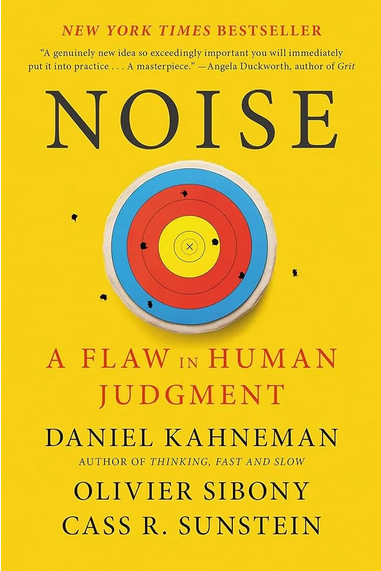Rob Henderson reviews the last published work of Nobel prize winner Daniel Kahneman and his co-authors Olivier Sibony and Cass R. Sunstein:
Are crowds smart or dumb? You may have heard the terms “wisdom of the crowds” and the “madness of crowds”. The former idea is that the collective opinion of a group of people is often more accurate than any individual person, and that gathering input from many individuals averages out the errors of each person and produces a more accurate answer. In contrast, the “madness of crowds” captures the idea that, relative to a single individual, large numbers of people are more likely to indulge their passions and get carried away by impulsive or destructive behaviors. So, which concept more accurately reflects reality?
Noise: A Flaw in Human Judgement by Daniel Kahneman, Olivier Sibony, and Cass R. Sunstein provides the answer. The authors share research indicating that “independence is a prerequisite for the wisdom of crowds”. That is, if you want to use crowdsourcing to produce accurate information, you have to ensure that people make their judgments in private. If people provide their answers in a public setting where they can see everyone else’s answers, then the crowd can transform wisdom into madness.
Relatedly, Wharton organizational psychologist Adam Grant has stated that “you get more and better ideas if people are working alone in separate rooms than if they are brainstorming in a group. When people generate ideas together, many of the best ones never get shared. Some members dominate the conversation, others hold back to avoid looking foolish, and the whole group tends to conform to the majority’s taste.” People converge on ideas they believe are held by the majority, when often they are simply acquiescing to the most assertive and strident members of the group. Grant suggests that the best way to sidestep this problem is to have people think up ideas on their own before the group evaluates them.
In Noise, Kahneman and his colleagues report findings indicating that, in tasks involving estimation, such as the number of crimes in a city or geographic distances, crowds are wise as long as they registered their views independently. But if people learn what others estimated, then crowds do worse than individuals. The book states that, “while multiple independent opinions, properly aggregated, can be strikingly accurate, even a little social influence can produce a kind of herding that undermines the wisdom of the crowds”.
There are many reasons why Kahneman’s 2011 book Thinking, Fast and Slow became a groundbreaking hit, while Noise did not reach quite the same heights (Kahneman and his statistically savvy co-authors might cite regression toward the mean). One reason for the difference may be the years in which the books were published. In 2011, the educated class generally favored meritocratic and objective measures for judgment and decision-making. They found the message that we should challenge the role of bias in our everyday judgments appealing, and believed that we should rid ourselves of habits that lead us to judge other people or situations unfairly. Today, however, much of intellectual culture has changed. Now that luxury beliefs are ascendant, relying on objective measures is no longer fashionable.




